The new paramount
leader to watch !
Malladi Rama Rao
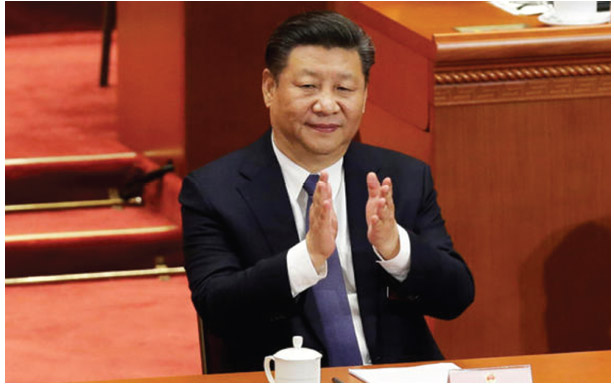 Xi Jinping
In the fortnight before the Dragon
handed over to its President Xi Jinping
limitless power, foreign minister Wang
Yi spoke of a healthy turnaround in
Sino-Indian relations. "Let's tango, not
fight," he said, adding that "even
Himalayas cannot stop improving our ties".
Xi Jinping
In the fortnight before the Dragon
handed over to its President Xi Jinping
limitless power, foreign minister Wang
Yi spoke of a healthy turnaround in
Sino-Indian relations. "Let's tango, not
fight," he said, adding that "even
Himalayas cannot stop improving our ties".
Wang made these remarks on Mar 8, 2018 in
Beijing while talking to journalists. He has since
been promoted as State Councillor in Xi's new
cabinet and may lead border talks with India.
Peaceniks have quickly jumped to the
conclusion that six months after the end of
Doklam faceoff with India, China was softening
its image. Some commentators opined that
President Xi looks to reset China ties with India.
And media reports suggest the possibility of an
informal Xi-Modi summit sometime in April.
The two leaders are also set to meet in June
when the Shanghai Cooperation Organisation
(SCO) holds its annual session.
This scenario brightened the prospects of
momentum returning to the relations between
the two Asian giants. But it did not last long. On
March 20, as he started his "new long" term as
President, Xi flagged nationalism, and thus
gave fresh currency to the long -- held view that optimism and despair alternate in the
Sino-Indian ties. He did not name any
country in his address to the Chinese
parliament- National People's
Congress (NPC), which mandated
absolute power to him, and put him in
league with Mao Zedong.
Well, Xi assured his receptive
audience that under his leadership,
China is not seeking hegemony but it
will be "absolutely impossible to
separate an inch of country's
territories." He went on to declare:
" We are resolved to fight the bloody
battle against our enemies, and on the
basis of independence we are
determined to recapture the relics.
Any action and tricks to split China are
doomed to failure and will be
condemned by the people and
punished by history."
The need for such a forthright
declaration remains unclear since
there is no visible threat to China and
its hegemony even in the South China
Sea region. Taiwan is not going
anywhere and so is Hong Kong. If
there is any threat of secession, it is in
the Xinjiang province, where Pakistan
and its Islamist friends are the real
force behind the Uyghur Muslim
unrest.
President Xi made no mention of
the Uyghur insurgency. Probably, he
still believes that the likes of Jaish-e-
Muhammad (JeM) chief Masood Azhar
will honour their commitment not to
disturb peace in Urumqi. Islamists'
promises should not be taken on face
value as the United States of America
has learnt the hard way. The kidnap
and ransom threats Chinese workers
are facing in Pakistan should have
been an eye-opener to Beijing. It is not
yet the case.
And this leaves India with which
China has had a territorial dispute in
the Himalays. China is also positioning
as a challenger in the Indian Ocean
region, what with its 'string of pearls.'
The Doklam standoff, if we go by the
views of noted Sinologist, Bertil
Lintner, was not designed against
India but aimed at driving a wedge
between India and Bhutan.
Xi has reasons to
worry as the debt
levels increased by
more than 100
percentage points, or
nearly doubled, over
the past decade – a
period in which he
had held the reins of
the country for five
years.
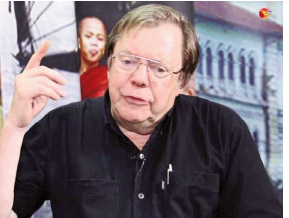 Bertil Lintner
How things would shape up vis-à- vis India is difficult to crystal gaze. It
should remain vigilant whether on the
Line of Actual Control (LAC) or in the
Indian Ocean region. Also, to the
challenge of a two –front war. More so
as the LAC witnessed highest number
of transgressions by Chinese military
patrols last year. The new defence
minister, Wei Fenghe, is known as
Missile Man. He is the man who is
credited with rapid modernisation of
Chinese army, and carving out the
Rocket Force and the Strategic Support
Force. Henceforth, his focus will be
cutting-edge technologies in areas like
drones, robots, aircraft carriers, radar
and missiles to sharpen the teeth of
the People's Liberation Army.
Bertil Lintner
How things would shape up vis-à- vis India is difficult to crystal gaze. It
should remain vigilant whether on the
Line of Actual Control (LAC) or in the
Indian Ocean region. Also, to the
challenge of a two –front war. More so
as the LAC witnessed highest number
of transgressions by Chinese military
patrols last year. The new defence
minister, Wei Fenghe, is known as
Missile Man. He is the man who is
credited with rapid modernisation of
Chinese army, and carving out the
Rocket Force and the Strategic Support
Force. Henceforth, his focus will be
cutting-edge technologies in areas like
drones, robots, aircraft carriers, radar
and missiles to sharpen the teeth of
the People's Liberation Army.
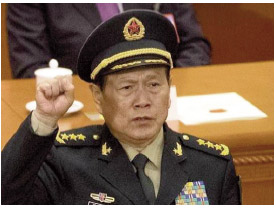 Wei Fenghe
President Xi's advice to his
countrymen should be taken with all
the seriousness it deserves. The
people of China must be ready to
contend with forces that are likely to
hinder their country's growth spiral, he
was quoted as saying.
Wei Fenghe
President Xi's advice to his
countrymen should be taken with all
the seriousness it deserves. The
people of China must be ready to
contend with forces that are likely to
hinder their country's growth spiral, he
was quoted as saying.
As economists of all hues aver,
what hinders China's growth
momentum is an internal danger
that comes from a huge pile up of
debt - corporate and household,
and it continues to swell. China's
overall debt-to-G.D.P. ratio already
exceeds 270 per cent which is
higher than that of most emergingmarket
economies.
Xi has reasons to worry as the
debt levels increased by more than
100 percentage points, or nearly
doubled, over the past decade – a
period in which he had held the
reins of the country for five years.
His goal is to make China a global
economic, political and military
superpower. But achieving the
economic miracle will itself need a
miracle.
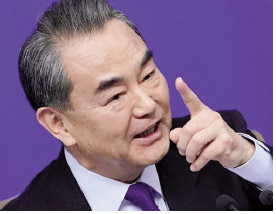 Wang Yi
As Tom Holland reported in the
South China Morning Post (March 5,
2018), President Xi is setting himself up
for failure with his style of government
and economic policy.
Wang Yi
As Tom Holland reported in the
South China Morning Post (March 5,
2018), President Xi is setting himself up
for failure with his style of government
and economic policy.
"….Xi's drive to centralise and
tighten his control over China's state
machinery and economy will rein in –
rather than unleash – animal spirits
and economic enterprise. The risk is that, with meaningful market-oriented
liberalisation largely off the table;
China will fall back on a continued
expansion of debt to maintain even
moderate growth over coming years,"
Tom wrote almost a week before NPC
made Xi President for life by removing
the two term limit on Presidency.
Will this prognosis hold ground in
the years ahead? Difficult to say but
if it does, Xi's call for nationalism
could help divert attention from
the immediate to a catchy rallying
point.
At this stage, it is not clear as to why
Xi Jinping opted to tighten his grip and
went about abolishing the two-term
limit for president and his deputies.
He appears to see "One Belt -One Road
nirvana in authoritarianism, which
sadly has not offered a recipe
anywhere anytime. The term limit was
a statutory provision paramount
leader Deng Xiaoping had got
incorporated in early 1980s as a check
against "empire building" he had
witnessed during the Cultural
Revolution.
Chris Buckley reports in the New
York Times (Mar 7, 2018) that Xi
made his power grab with "stealth,
speed and guile".
After working behind the scenes for
months, (some reports say he got the
Politburo nod last Sept), Xi made the
CPC's Central Committee give the go
ahead to his plan in early January. It,
however, came to light almost a
month later. The annual session of
China's Parliament rubber-stamped
the deal on March 11, with as many as
2,958 deputies voting in favour. Only
two voted against and three abstained.
"I always thought Xi would seek to
stay for three or four terms, and could
even introduce a new presidential
system after his terms were finished.
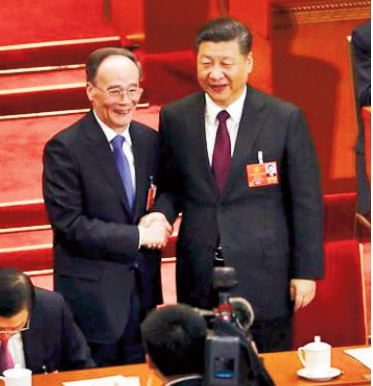 Wang Qishan with Xi Jinping
But I never thought the Constitution
would be revised so quickly," Wu Wei,
a former official who advised
Zhao Ziyang, the party leader
ousted during the mass protests of
1989 in Tiananmen Square, was
quoted as saying in a media dispatch.
Wang Qishan with Xi Jinping
But I never thought the Constitution
would be revised so quickly," Wu Wei,
a former official who advised
Zhao Ziyang, the party leader
ousted during the mass protests of
1989 in Tiananmen Square, was
quoted as saying in a media dispatch.
Xi is going about systematically
tightening his hold on the bureaucracy, and the Army. He has set
up National Supervision Commission
to extend Communist Party's arbitrary
disciplinary regime across the country.
The new edict says failure to
"effectively implement" his edicts will
be deemed as "corruption by
inaction".
"Xi Jinping Thought" has officially
become the guiding ideology for the
country. Several of his ideas,
concepts and policies have entered
the constitution. These include:
"new development model", "social
and ecological civilisation",
"harmonious and beautiful",
"modern and powerful [country]",
"achieve the rejuvenation of the
Chinese nation", "shared destiny of
mankind" and "promote core
socialist values".
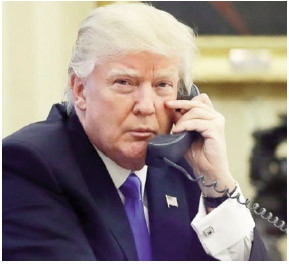 Donald Trump
The Chinese constitution now
describes the Communist party's
leadership as the "the most
fundamental characteristic" of Chinese
socialism. Put simply, it means CPC is
the only party fit to rule China, and Xi
is the paramount leader.
Donald Trump
The Chinese constitution now
describes the Communist party's
leadership as the "the most
fundamental characteristic" of Chinese
socialism. Put simply, it means CPC is
the only party fit to rule China, and Xi
is the paramount leader.
No surprise,
therefore, "who would dare to
challenge or transcend Xi or offer him
any advice," asks Tseng Chien-yuan,
an associate professor at Chung Hua
University in Taiwan.
Well, this is dangerous since
it makes China slide back
into strongman politics. Already
the Xi regime has seen a
tightening of controls on society both online and offline.
Says a commentator
"Personalisation of power under Xi
began in 2016, when he was anointed
the core of the party – bringing back an
obscure title that had not been used
for 10 years and had previously been
held only by leaders in power for more
than two consecutive terms."
On the foreign policy front, President Xi has put in
place a team of "highly trained experts" to help
deliver on his global goals. Most of them have made
their mark in handling the West. The new vice
president, Wang Qisham, who has been a major
player in Xi's battle against corruption, also has
experience in dealing with the U. S. A signal that Xi is
increasingly worried about Washington, which under
President Trump, has become unpredictable in
diplomacy and tariff regime.
On the foreign policy front,
President Xi has put in place a team of
"highly trained experts" to help deliver
on his global goals. Most of them have
made their mark in handling the West.
The new vice president, Wang Qisham,
who has been a major player in Xi's
battle against corruption, also has
experience in dealing with the U. S. A
signal that Xi is increasingly worried
about Washington, which under
President Trump, has become
unpredictable in diplomacy and tariff
regime.
Xi's economic policies may be in the
hands of a hand-picked Harvardreturned
in his quest for a new
development model Growth has been
a mirage beyond the four metros and
poverty and debt levels are not looking
south. There is no longer pressure on
Chinese companies to spread
overseas. Instead they are facing the
axe for debt–fuelled spending.
One such company is Anbang
Insurance Group, whose acquisitions
include the iconic Waldorf Astoria
hotel in New York and major financial
firms in South Korea and the
Netherlands as well as overseas
properties worth billions of dollars.
The state has since taken over the
company. Will one act be enough?
That is a question with no answers.
The Chinese economy flush with its
own variant of black money is
primarily export-driven and addicted
to debt. President Xi may be serious to
cleanse the financial system and
stabilise the world's second largest
economy. Scepticism is justified
nevertheless. Reason? The Chinese
officials are known to be reluctant to
"pare back at the risk of curbing
growth and provoking unrest".




 Xi Jinping
Xi Jinping Bertil Lintner
Bertil Lintner Wei Fenghe
Wei Fenghe Wang Yi
Wang Yi Wang Qishan with Xi Jinping
Wang Qishan with Xi Jinping Donald Trump
Donald Trump